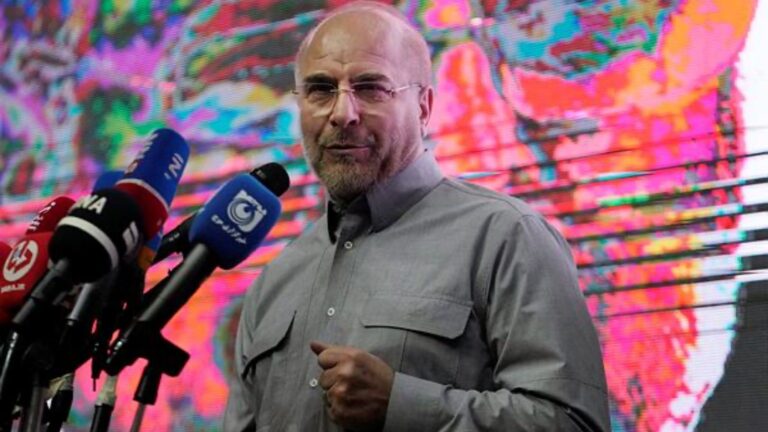Iranians will elect a president on Friday in tightly controlled elections following the death of Ebrahim Raisi in a helicopter crash last month, with the outcome likely to influence who will succeed Ayatollah Ali Khamenei as Iran’s top decision-maker.
Iran’s Supreme Leader Ayatollah Ali Khamenei is 85 years old and the president-elect is likely to be closely involved in the final process of selecting a successor to him, who has ensured that candidates who share his hardline views dominate presidential elections.
The elections come at a time of rising regional tensions due to the conflict between Israel and Hamas, increasing Western pressure on Iran over its fast-growing nuclear program, and growing domestic opposition to political, social and economic crises.
But the imminent succession of Khamenei, who is virulently anti-Western, is the biggest concern among Iran’s clerical elite.
The Oversight Council, made up of hardline clerics and jurists aligned with Khamenei, approved five hardliners and one low-profile moderate from an initial slate of 80 candidates.
Prominent among the hardliners are Mohammed Baqer Qalibaf, speaker of parliament and former head of the powerful Revolutionary Guards, and former nuclear negotiator Saeed Jalili.
The only moderate candidate, Massoud Pezeshkian, has the backing of Iran’s politically marginalized reformist camp, which advocates detente with the West.
Khamenei, a rabid anti-Western figure, has not publicly endorsed any candidate, but in a televised address on Tuesday he said “anyone who thinks they can do nothing without American goodwill will not be able to run their country well.”
Adviser Yahya Rahim Safavi called on voters to elect “a president who is not at odds with the supreme leader’s ideas,” state media said.
“The people should choose a president who sees himself as number two…. A president should not create division,” said Safavi, a former Guard commander.
Although the president’s role receives international attention, real power resides with the supreme leader, who has the final say on national issues such as foreign and nuclear policy, and controls all branches of government, the military, the media, and most of the financial resources.
Raisi is widely seen as a possible successor to Khamenei. His sudden death A race has erupted among hard-liners to influence the selection of Iran’s next supreme leader.
A divided nation
An Iranian insider close to Khamenei, speaking on condition of anonymity because of the sensitivity of the issue, said the supreme leader “will not tolerate political infighting at a time when unity among those in power is essential.”
“A president who is loyal and fully aligned with the supreme leader and a trusted ally of the Revolutionary Guards could contribute greatly to a smooth transition of power,” the official said.
The clergy’s ardent supporters HardlinersLimited electoral options, frustration at the crackdown on dissent and anger over deteriorating living standards may lead many Iranians to choose to abstain.
Pezeshkian, a fierce loyalist to Khamenei, will have no chance of winning unless he can attract millions of disappointed, mainly young, voters who did not vote in elections since 2020, and whether divisions among the five hard-line candidates persist.
But the reformists’ electoral strength is unclear, as some voters believe they have failed to expand freedoms during previous administrations.
The unrest sparked by the death in custody of Mahsa Amini, a young Kurdish woman, in 2022 exposed the widening rift between reformists and their power base, as leaders distanced themselves from protesters demanding “regime change”.
Reformists remain loyal to Iran’s theocracy but advocate detente with the West, economic reform, social liberalization and political pluralism.
Khamenei called for high voter turnout to “silence the enemies of the Islamic Republic.”
Oppositionists inside and outside Iran have widely circulated the hashtag “#ElectionCircus” on social media platform “X,” calling for a boycott of the election, arguing that a high voter turnout would legitimize the Islamic Republic of Iran.
Imprisoned Iranian Nobel Peace Prize laureate Narges Mohammadi, in a message from Tehran’s Evin Prison, said the vote would be a “sham” election.
She said the government was relying on repression to maintain power and that the purpose of holding elections was “not to protect democracy and people’s rights but to strengthen power and tyranny.”
But prominent reformist politicians have warned that a low turnout will allow hard-liners to maintain control over all sectors of the state.
Raisi won the 2021 election with around 49% of the vote, down from 70% in 2017 and 76% in 2013, mainly amid widespread voter apathy.
The five hardline candidates largely avoided discussing social and political freedoms on the campaign trail and in television debates, and while they acknowledged the country’s economic crisis, they offered no concrete plans to address it.
Pezechkian, 69, a former health minister, has spoken out for social freedoms and campaigned for the rights of women and minorities, and has pledged to push for a more pragmatic foreign policy.
If no candidate receives at least 50% of the total votes, including blank votes, plus one, a runoff election will be held between the top two candidates.

